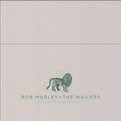The Complete Island Recordings
Author: Nigel Williamson
View album and artist detailsAlbum and Artist Details
Artist/band: |
Bob Marley & The Wailers |
Label: |
Universal |
Magazine Review Date: |
December/2015 |
Ask musicians from all corners of the globe to name a hero or inspirational figure, and it's a fair bet that many of them will nominate Bob Marley. The reasons are obvious and not only to do with the music. As the first global pop superstar to emerge from what we used to call the third world, Marley's success served as a beacon of hope to other artists from developing countries. And his uncompromising political stance made him an icon to the world's deprived and dispossessed. On my own world music travels, I’ve encountered kids wearing ‘Rastaman Vibration’ T-shirts in a Masai village, an Aboriginal settlement in the Australian outback and a Palestinian refugee camp. But Marley didn’t achieve world domination alone, as is shown by these nine studio and two live albums he recorded with The Wailers for Island Records between 1973 and his death in 1981. They have been reissued in an impressive Zippo lighter-styled box, as part of the celebrations to mark what would have been his 70th birthday this year.
By the time Marley was signed by Chris Blackwell to Island, he had already been recording for a decade; there are reggae aficionados who much prefer the rawness of The Wailers’ earlier and earthier recordings. But Blackwell re-styled Marley for a predominantly white rock audience, not only emphasising his status as a ‘rebel’ (which was easy and natural enough), but adding rock guitars and rhythmic heft to the sound. It's immediately evident on ‘Concrete Jungle’, the opening track on Marley's first Island album, 1973's Catch a Fire. It begins with a moody, echoing solo by American session guitarist Wayne Perkins that could have been borrowed from a Pink Floyd record; it's a whole 32 seconds before the reggae beat kicks in. If you can track down the original Jamaican recording before Blackwell added the overdubs in Island's London studios, you will hear a radically different song with not a rock guitar in sight. The same approach applies throughout these recordings and by 1977's Exodus the sound had been polished and commercialised still further in a bid to break the American market.
It can, of course, be argued that this process compromised the authenticity of Marley's music, although you’d have to be a particularly bone-headed purist to make such a complaint, given that his lyrics continued to seethe with insurrection. A more rational view would be that Blackwell helped Marley to translate an obscure music from a tiny Caribbean island into a mighty, world-conquering sound that in many ways laid the foundations for today's world music industry.
By 1979's Survival, Marley was writing songs with titles such as ‘Africa Unite’ and was already emerging as a powerful spokesman for the world's under-privileged masses. It's fascinating to imagine what radical fusions his music might have undergone if he’d been able to visit Zimbabwe to perform at the independence celebrations in 1980. But he was riddled with cancer and, within 12 months, he was dead at the age of 36. No self-respecting record collection is complete without these essential albums. They come at a price, however. Even if you shop around online, expect to pay in excess of £200 for the set.

